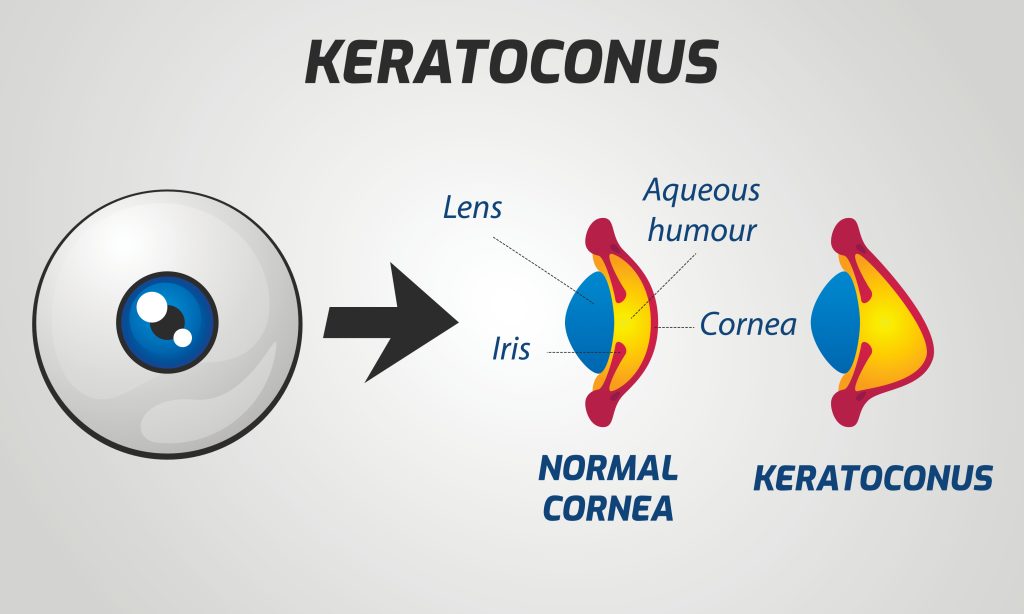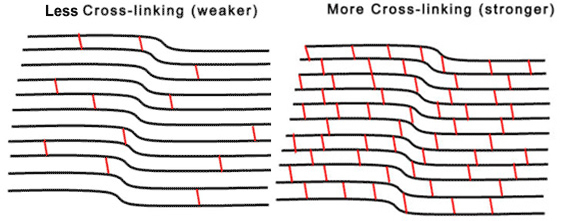Do you or someone you love have keratoconus? You’re not alone, as this eye condition affects many people.
Keratoconus is a progressive eye condition that can cause significant vision loss. There’s no way to reverse the condition.
If keratoconus progresses far enough, it can become impossible to correct your vision using traditional visual aids like glasses or special contact lenses. At this point, the only way to prevent the eye condition from progressing is usually with a corneal transplant, which involves removing and replacing the damaged cornea with a donor cornea.
However, there is a treatment that can slow and even halt keratoconus called corneal collagen crosslinking (CXL). Corneal collagen crosslinking cannot cure keratoconus but can prevent severe vision loss that necessitates a corneal transplant. Keep reading to learn how corneal collagen crosslinking treats keratoconus and what this means for patients with this eye condition!
What is Keratoconus?

Before you can understand corneal collagen crosslinking, you need to grasp what keratoconus is and what it does to your vision. Keratoconus occurs when your cornea becomes too thin, causing it to bulge out and become cone-shaped.
The cornea should be dome-shaped, and when the cornea becomes more of a cone shape, this affects the ability to see clearly in patients. Keratoconus is a progressive eye condition.
Because keratoconus is a progressive eye condition, any thinning and bulging of the cornea occurs gradually and slowly, usually over a period of years. Keratoconus also usually develops in adolescents and young adults.
The way keratoconus changes the shape of the cornea causes visual problems. Patients with keratoconus often struggle with reduced visual clarity, among other frustrating symptoms.
Irregularities in the shape of the cornea are not uncommon, as these irregularities cause refractive errors like nearsightedness and farsightedness. However, keratoconus causes such significant irregularities that it can be difficult to correct your vision if you have it.
Patients often need specialized contact lenses called scleral contact lenses. Scleral contact lenses are rigid, large lenses that fit over the entire surface of the cornea and rest on the cornea.
However, scleral lenses cannot stop the cornea from bulging out more. If left untreated, keratoconus can impair your vision, making it so that it’s no longer possible for visual aids to provide any correction.
Corneal collagen crosslinking can prevent further progression and vision loss from keratoconus.
What is Corneal Collagen Crosslinking?
Corneal collagen crosslinking (CXL) is a minimally invasive procedure that strengthens the cornea, making it harder for it to become thinner and bulge out. This is done by creating more bonds between collagen fibers.
Your cornea is composed of collagen fibers, and adding more bonds (or links) between them makes it harder for those fibers to drift apart. Creating more bonds between collagen fibers strengthens the cornea, helps ensure that keratoconus can no longer progress, and keeps your cornea from becoming more irregular in shape.
How Does Corneal Collagen Crosslinking Work?

The collagen fibers in your cornea naturally form more bonds as you age. Many factors, including genetics, environment, and even hormones, can potentially explain why keratoconus affects young people.
Corneal collagen crosslinking can quickly create new bonds between collagen fibers at any age. This is achieved by applying a photosensitizer to the eye.
A photosensitizer is a molecule that produces a chemical change in another molecule, in this case, collagen fibers, when exposed to natural light. The photosensitizer used for collagen corneal crosslinking is riboflavin or vitamin B2.
UV light activates the riboflavin after being applied to the eye, creating more bonds between collagen fibers.
What to Expect During the Corneal Collagen Crosslinking Procedure
Undergoing corneal collagen crosslinking is minimally invasive and painless. First, numbing eye drops are applied as your eye is held open.
Once the eye is numb, the outer layer of your cornea called the epithelium, is carefully removed. Then, liquid riboflavin is applied by a dropper directly onto your exposed cornea.
Once your eye is coated, a light delivery device is placed directly over the eye to emit UV light to activate the riboflavin. Afterwards, a bandage contact lens is placed over your eye.
Corneal collagen crosslinking only takes a few minutes to complete and has a minimal recovery. Because corneal collagen crosslinking is an outpatient procedure, you’ll go home once it’s complete.
The epithelium will regenerate and grow back after a few weeks, and the bandage contact lens will continue protecting your eye. Your ophthalmologist at See Clearly Vision may also prescribe you eye drops to help with healing and recovery.
Who is a Good Candidate for Corneal Collagen Crosslinking?

Although corneal collagen crosslinking is an excellent way of treating keratoconus, it is not suitable for all patients with the eye condition. Your candidacy for this treatment depends on the speed of progression.
Corneal collagen crosslinking is best when used in the early stages of keratoconus, as it helps slow further progression of the condition. Your ophthalmologist may also recommend using it alongside other procedures to treat keratoconus.
After having corneal collagen crosslinking, you’ll still need visual aids to see. Corneal collagen crosslinking only prevents further vision loss but cannot reverse vision loss.
Your ophthalmologist will recommend corneal collagen crosslinking if you’re a patient with keratoconus who could benefit from the procedure. Corneal collagen crosslinking can prevent significant vision loss and save you from undergoing a corneal transplant.
As it’s a significantly less invasive procedure than a corneal transplant, it’s highly beneficial and worth considering if your eye doctor thinks you’re a good candidate for corneal collagen crosslinking.
Do you have keratoconus? Find out if you could be a good candidate for corneal collagen crosslinking by requesting an appointment today at See Clearly Vision in McLean and Arlington, VA!



















